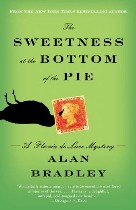 Alan Bradley •
Alan Bradley •
The Sweetness at the Bottom of the Pie •
Few protagonists dominate their stories as completely as eleven-year-old Flavia de Luce, a chemistry whiz whose particular delight is poisons. When we meet her, Flavia is bound, gagged, and locked in a closet courtesy of the “beasts,” older sisters Feely and Daffy (Ophelia and Daphne). Early next morning she finds a dead body in the cucumber patch behind Buckshaw, her family’s estate, and the real fun begins.
Our heroine thinks nothing of stowing away in the back of a lorry; climbing a clock tower in total darkness; and picking a lock with her dental braces. “Confessing” to the murder she fears her father has committed requires considerable ingenuity, but Flavia’s up to the challenge. “There was a sudden gurgle in his throat, almost as if he had suffered congestive heart failure due to a bout of rheumatic fever he suffered as a child,” she offers helpfully to the police.
And when the de Luces’ shell-shocked manservant, mentally reliving his war days, cringes under imaginary fire, it’s Flavia to the rescue. “It’s all right, Dogger!” she calls reassuringly out a bedroom window. “I’ve got them covered from up here.” At the sound of her voice he goes limp, “like a man who has been holding a live electrical wire in which the current has just been shut off.”
Flavia never met a simile she didn’t like. Her fertile mind makes a nonstop stream of connections: Bulwer-Lytton’s prose “as stiff and inflexible as a parlor poker”; windshield wipers “like black scythes”; a man’s face “as large and craggy as the Matterhorn.” The dead bird that appears on their doorstep with a postage stamp impaled on its beak has “stiff wings extended like a little pterodactyl.”
The world through Flavia’s eyes is a wonder to behold, and her adventures are purely addictive.







I need to read this!